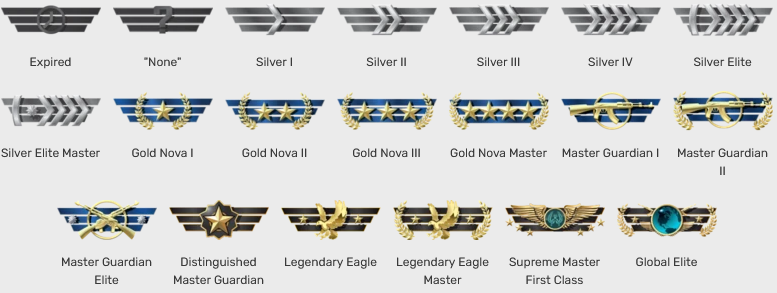Canal Mail Corp: Your Hub for Daily Insights
Explore the latest news, tips, and trends across various topics.
Why CSGO Ranks Feel Like Dating: The Ups and Downs of Competitive Play
Explore the rollercoaster of CSGO ranks like dating—unexpected highs, painful lows, and why it’s all worth it for the thrill of competition!
How CSGO Ranks Mirror Dating: The Thrills and Heartbreaks of Competitive Gaming
In the world of CSGO ranks, players find themselves on an electrifying rollercoaster of victories and defeats that closely mirrors the realm of dating. Each rank, from Silver to Global Elite, represents different skill levels, much like the varying stages of romantic relationships. The thrill of climbing the ranks can be exhilarating, akin to the excitement of a blossoming love, where each win boosts your confidence and propels you to higher echelons. However, the anxiety that accompanies each match can feel all too similar to the pressure of a first date, where the fear of rejection looms large. Just as in dating, a winning streak can instill a sense of invincibility, while a string of losses can lead to self-doubt and frustration.
Yet, with the heartbreaks of competitive gaming comes invaluable lessons and growth. Just as relationships often end in heartbreak, so too do matches result in hard-fought losses. Players must learn to overcome these setbacks, much like moving on from a failed romance. The resilience developed through CSGO not only hones gaming skills but also fosters personal growth—a reminder that both the gaming arena and the dating scene require patience and perseverance. Embracing the journey, with its ups and downs, can lead to a stronger, more skilled player, just as navigating through the complexities of love can lead to deeper connections.

Counter-Strike is a highly competitive first-person shooter game that has captivated players around the world. It requires teamwork, strategy, and precise aiming skills. Many players seek to customize their gameplay with specific settings to enhance their performance, such as b1t settings that can impact gameplay positively.
Are Your CSGO Ranks Affecting Your Gaming Confidence? Exploring the Psychological Impact
In the competitive environment of CSGO, rank plays a pivotal role in shaping players' self-esteem and gaming confidence. Many gamers find themselves emotionally tied to their ranks, leading to the psychological phenomenon known as rank anxiety. As players strive to climb the ranks, they often experience a heightened sense of pressure, which can inadvertently undermine their performance. The belief that one’s rank defines their skill level can create a vicious cycle of self-doubt and decreased motivation, pushing players to avoid ranked matches altogether for fear of losing their hard-earned status.
Moreover, the social aspect of competitive gaming further compounds this issue. Players often compare their ranks to those of friends or community members, leading to feelings of inadequacy. This comparison can trigger a sense of imposter syndrome, making it difficult for players to derive enjoyment from the game. To combat this, it’s essential to shift the focus from rank to personal improvement. Celebrating small victories, like improving aim or communication skills, can help rebuild confidence and foster a healthier mindset towards CSGO gameplay. Remember, while ranks are an important aspect of the game, they do not define your overall gaming experience.
The Dating Game of CSGO: How Relationships and Rankings Influence Each Other
In the world of CSGO, the dynamics of player relationships can play a crucial role in how players approach the game. As friendships blossom, players often find themselves forming teams, which can significantly influence their rankings. These connections can enhance communication and strategy, leading to improved performance in matches. For instance, players are more likely to succeed in competitive settings when they have established trust and understanding with their teammates. This phenomenon showcases how relationships not only enrich the gaming experience but also serve as a pivotal factor in achieving higher rankings.
Moreover, the competitive nature of CSGO can lead to heightened emotions, impacting both personal relationships and performance on the battlefield. When players are highly invested in their rankings, the pressure can create tension not just within teams but also among casual friends who play together. As a result, maintaining a healthy balance between competition and camaraderie is essential. Understanding the interplay between relationships and rankings can help players navigate the social complexities of the game while striving for improvement in their skills.